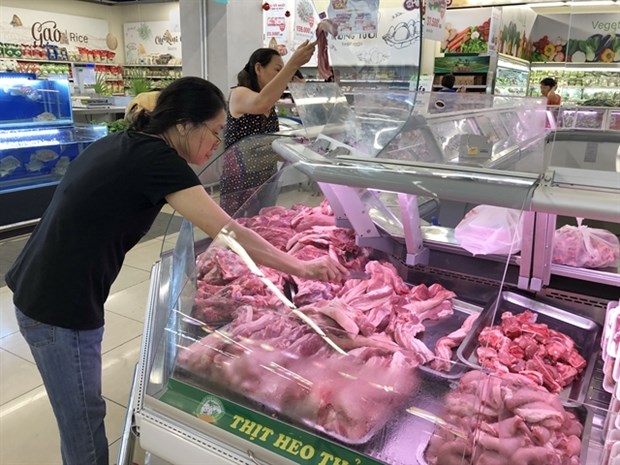HCM City, provinces work together to ensure supply of goods at stable prices
HCM City will continue to work with southwestern cities and provinces to ensure an adequate supply of goods at stable prices, according to the city Department of Industry and Trade.
 Illustrative image (Photo: VNA)
Illustrative image (Photo: VNA)HCM City (VNA) - HCM City will continue to work with southwestern cities and provinces to ensure an adequate supply of goods at stable prices, according to the city Department of Industry and Trade.
Nguyen Quynh Trang,
the department’s deputy director, said that a market stabilisation programme between the city and the southwestern region has helped HCM City distributors
and retailers find suppliers of quality products.
Addressing a recent conference reviewing the programme, she said that
manufacturers have been able to find steady outlets for their products, and as
a result, have invested more in expanding production and
improving product quality.
Annual conferences
have brought together suppliers and buyers between HCM City and
localities in the southeastern and southwestern regions. This has increased
consumption of the two regions' goods in HCM City and exports via
city-based firms.
Trang said the
department will continue to cooperate with cities and provinces in the region
to exchange information about goods supply and demand, and
help firms create production and distribution links. It will
also strengthen inspections to secure product quality.
Tran Chi Dung, head
of the city's Department of Industry and Trade’s market management division,
said the prices of most food and foodstuff items in the city
and the southwestern region have been stable in 2019, except for pork.
African Swine Fever
(ASF) has seriously affected the local pig breeding sector,
reducing pig herds by 30 percent over last year.
Pig prices
fell sharply from March to May, but from June prices gradually rose, he said.
Tran Phuong Nga,
representative of Saigon Co.op, said that Saigon Co.op has participated in
stabilising prices of nine commodity groups, including pork products.
“In the context of
price fluctuations of pork and pork-based products due to ASF, Saigon
Co.op needs close coordination from suppliers to keep prices stable, while
management agencies from central to local levels need to prevent further
increases, especially in the days before the Lunar New Year (Tet)
holiday,” she said.
With Tet holiday
approaching, demand for many other essential products, especially pork, will
increase strongly.
Conference
delegates agreed that besides calling on large pig farms and traders to
keep prices stable, consumers should be encouraged to change
their habit of buying fresh pork and instead buy chilled and frozen
pork, and also increase the use of poultry meat and seafood.
Trang said to ensure
pork supply, from the beginning of the year to December 10, businesses in
the city imported nearly 14,000 tonnes of pork, an increase of over 150 percent compared to the same period last year.
Poultry meat
suppliers such as Ba Huan and San Ha have committed to increase supply by 30
percent for Tet, she said.
Ho Chi Minh City is the largest city in Vietnam and the economic hub of the southern region. Accounting for 0.6 percent of Vietnam’s total land area and about 9 percent of the country’s population, it is part of the southern key economic zone, which also comprises Dong Nai, Ba Ria - Vung Tau, Binh Duong, Long An, Tay Ninh and Binh Phuoc provinces. In the southern economic hub, over 3,000 projects across all sectors are supported by foreign capital, while the number of registered enterprises has exceeded 100,000.
In 2019, the city attracted 8.3 billion USD worth of foreign investment, with its labour productivity being nearly three times that of the whole country (299.8 million VND per person, an increase of 6.8 percent over 2018).
The local gross regional domestic product (GRDP) reached more than 1.34 quadrillion VND, an 8.32 percent increase year-on-year.
Before the outbreak of COVID-19, the city set a target of achieving a growth rate of 8.5 percent for GRDP in 2020, with total private investment accounting for 35 percent of GRDP.
This year, HCM City also aims to have 44,000 new businesses, creating 135,000 new jobs./.
Ho Chi Minh City is the largest city in Vietnam and the economic hub of the southern region. Accounting for 0.6 percent of Vietnam’s total land area and about 9 percent of the country’s population, it is part of the southern key economic zone, which also comprises Dong Nai, Ba Ria - Vung Tau, Binh Duong, Long An, Tay Ninh and Binh Phuoc provinces. In the southern economic hub, over 3,000 projects across all sectors are supported by foreign capital, while the number of registered enterprises has exceeded 100,000.
In 2019, the city attracted 8.3 billion USD worth of foreign investment, with its labour productivity being nearly three times that of the whole country (299.8 million VND per person, an increase of 6.8 percent over 2018).
The local gross regional domestic product (GRDP) reached more than 1.34 quadrillion VND, an 8.32 percent increase year-on-year.
Before the outbreak of COVID-19, the city set a target of achieving a growth rate of 8.5 percent for GRDP in 2020, with total private investment accounting for 35 percent of GRDP.
This year, HCM City also aims to have 44,000 new businesses, creating 135,000 new jobs./.













